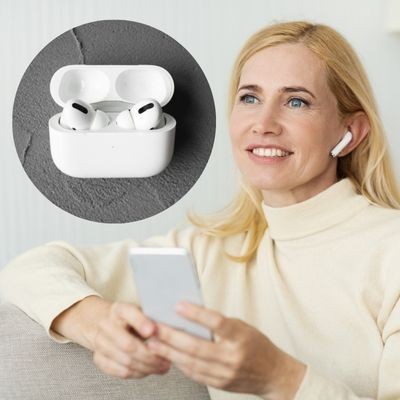
Head of Online Medical Content

Audiology Expert at Hearing Aid UK

Private hearing aids and audiology services in nursing homes and care homes
How to get help locally with hearing aids and hearing healthcare
Overview | The risks of poor hearing in the elderly | What do we offer? | Tips for family | Tips for carers | Conclusion
Care homes, nursing homes and private hearing aids
You may have a loved one who is a resident of a nursing home. Even if you live close by you may still get concerned about their welfare and whether their needs are being met. Along with socialising, being as active as possible, and eating well, are they hearing well?
In reality, hearing healthcare generally takes a back seat, as medical and hygiene care take priority within nursing homes.
From experience, we have a high volume of customers who contact us in regards to a loved one in a care home who is struggling with poorly fitted devices that are painful to wear or NHS hearing aids that are no longer beneficial. They are now looking to upgrade and seek private hearing healthcare locally, with the right aftercare going forward.
In this article, we discuss the dangers of poor hearing in the elderly, provide guidance on how to build a strong relationship with the carers and provide tips on hearing aid care in the nursing home and the private hearing aids and healthcare we offer.
The risks of poor hearing in the elderly in care homes
We are generalising here, but the consensus is that residents who are already wearing hearing aids are not getting the support they need to maintain their devices, adjust them when needed or even put them in - especially when dexterity is an issue.
The risk here is that they get frustrated and avoid wearing the devices altogether resulting in them losing confidence and feeling isolated and unable to communicate properly. As we get older, our hearing naturally deteriorates, which often develops into an age-related hearing loss (or presbycusis).
Even if we don't live in a nursing home, we rely on hearing well to maintain a good quality of life. Without it, we can experience cognitive problems, anxiety, and isolate ourselves from what we once loved. For instance, socialising, exercising and communicating with family and friends.
From another perspective, Alzheimer's patients and their cognitive impairment symptoms can often overshadow hearing loss detection. Undiagnosed losses can lead to further confusion and anger for the patient and can increase episodes. Such patients need regular hearing tests, hearing aid adjustments, device maintenance and aftercare.

Private hearing healthcare in care homes and nursing homes
What do we offer our patients in nursing homes and care homes?
Private hearing aids for nursing home residents
We offer free hearing tests in nursing homes and other audiology services with local audiologists you can trust. Our hearing healthcare in nursing homes is generally carried out the same way as any other home visit.
The only difference is that you might want to attend for support or to help relay personal information, take in audiology information or make future decisions.
Making the right decisions for your loved one's hearing is often met with many variances to consider. It involves scheduling appointments, receiving and understanding advice, making choices that are right for them, implementing the advice given and maintaining their hearing health. Therefore, family involvement is often important.
Once the appointment is arranged, you will need to let the management of the facility know of the visit. Other than that, it is the same process as any other home hearing healthcare visit.
Here are a few audiology services we offer in care homes:
- Free hearing tests in care homes and hearing loss diagnosis
- Discuss the benefits of private hearing aids and how they can improve the quality of life
- Offer the full selection of hearing aids available on the market
- Include hearing aid fitting and programming
- Include hearing aid fine-tuning and adjustments when needed
- Educate on hearing aid management, maintenance and how hearing and communication needs can be met
- Hearing healthcare, aftercare and future treatment plans
- Offer all hearing aid assistive devices from all brands
- Include the hearing aid manufacturer's warranty
- Offer an extended hearing aid warranty for extra peace of mind.
Take control and improve your relationship with the nursing home
Developing a good relationship with the nursing home staff is a great foundation for better hearing care in the future. Ensuring you are familiar with the care home's policies on hearing aids will also go a long way.
For example, a simple discussion about how and when to put the hearing aids in and out, as well as battery changes and charging the devices, will educate the staff and give you peace of mind.

Hearing aids and audiology services in nursing homes and care homes
Private hearing aids and nursing homes
Private hearing aid care tips:
- Avoid lost hearing aids in nursing homes and use labels: Write your loved one's name on the hearing aids, so they can be easily returned if lost. You can also use a bright colour pen to make it easier to locate if dropped.
- Find a bedtime storage solution: A clear box or using the case the hearing aids originally came in will keep them safe from any moisture and ensure they are easily found. Rechargeable hearing aids should be put in the charging pod every night.
- Keep up with hearing aid maintenance: In reality, hearing aid maintenance is hard to keep up within a care home setting, therefore, you and the audiologist will be responsible for such tasks.
Such as keeping a record of tasks completed, so you are always up to date with cleaning the hearing aid devices. More intricate maintenance duties will be done by your local audiologist.
- Insurance for hearing aids in care homes: You might want to research additional coverage for hearing aids in addition to the standard manufacturer's warranty. For example, we offer hearing aid warranty cover for all our customers.
You might find this gives you peace of mind, whilst your loved one wears their devices. This includes a replacement for accidental damage, theft or loss.
We support older people with hearing loss in care settings with private hearing aids and hearing healthcare
In summary, all our audiologists have always been great advocates for family involvement. We believe that building a strong and trusting relationship with our patients, along with their families, is invaluable. We also know that treating everyone as though every hearing loss is the same will not work. We partner with the family members to better support the patient.
Tips for how you can educate carers on how to manage your loved one's hearing aids
Managing hearing aids in a care home setting can be challenging due to the complex needs of the residents and the fast-paced nature of the environment. Here are some tips for managing hearing aids in a care home:
- Establish a routine for cleaning and maintaining the hearing aids: This should include regularly cleaning the devices with a soft, dry cloth, replacing the batteries, and keeping the devices dry. It is also important to have a system in place for handling any issues that arise with the hearing aids, such as a lost or broken device.
- Educate staff and residents about the importance of wearing and properly using the hearing aids: This may include training staff on how to properly fit and adjust the devices, and reminding residents to wear their hearing aids consistently and to follow the prescribed care instructions.
- Encourage open communication and collaboration between staff and residents: It is important for staff to regularly check in with residents about the effectiveness of their hearing aids and to be open to feedback and suggestions.
Staff should also work closely with the residents' healthcare providers to ensure that the hearing aids are properly fitted and adjusted to meet the residents' needs.
- Make accommodations for residents with hearing loss: This may include installing visual aids, such as flashing lights or vibrating alerts, to help residents with hearing loss stay informed about important events or emergencies.
It may also involve providing written materials, such as menus or schedules, or using assistive listening devices, such as FM systems or loop systems, to help residents better hear conversations and lectures.
- Consider the use of remote monitoring technology: Some hearing aid manufacturers offer remote monitoring technology that allows healthcare providers to remotely adjust the devices to meet the changing needs of the residents. This can be particularly helpful in a care home setting, as it allows for more efficient and convenient management of the devices.
For further reading for your loved one's care staff, we recommend asking them to read Action on Hearing Loss's brochure on "Supporting older people with hearing loss in care settings" here
Why Choose Us?
- FREE Hearing Tests
- Best Hearing Aids and Prices
- FREE Aftercare for Life
- FREE Home Visits
- 200+ Local Audiologists
- 60 Day Money Back Guarantee
We can support you or a loved one's hearing healthcare on-site
Overall, it is important for care home staff to be proactive in managing the hearing aids of their residents, as this can help improve communication, independence, and quality of life for those with hearing loss.
We can support you locally at your loved one's nursing home at a convenient time for you and them. Call us free on 0800 567 7621 for more information, to answer any questions and support you going forward.
Other articles on hearing aid advice you might like...
 Do Hearing Aids Work for Everyone?
Do Hearing Aids Work for Everyone?  Wearing Hearing Aids with Glasses
Wearing Hearing Aids with Glasses  Risks of Wearing Apple AirPod Pro 2's
Risks of Wearing Apple AirPod Pro 2's What's included in our hearing aid prices?
Our specialist service includes:
Do not spend hundreds of pounds without getting a second opinion from us.
Please call us on 0800 567 7621
 Not only are the prices great, but the service is fantastic! Many thanks to your team.
Not only are the prices great, but the service is fantastic! Many thanks to your team.Common FAQs when researching hearing aids and hearing loss
If you are looking at this page then it is likely that an audiologist has suggested that you purchase this particular hearing aid, so is this the best model for you?
In general, any audiologist will always recommend to you the model that best suits your needs. Here is a useful checklist to make sure that is the case.
- Audiologist level of knowledge: The audiologist you have seen will hopefully have a wide knowledge of all available hearing aids, however, some will only be familiar with a small number of brands and therefore may not really be in a position to know which model is the best for you. It is OK to challenge their recommendation and ask them to justify why this particular brand is the one for you.
- Do research: Read about the hearing aid that was recommended. Does it seem like it will suit your lifestyle? Does it have more or fewer features than you need?
- Be aware of sales targets: Many high street retailers have specific tie-ins to a particular manufacturer/brand. The hearing aid they have suggested may still be the correct one for you, but do your research so that you know why they might have recommended it.
If in doubt, feel free to give us a call. That's what we're here for. In the meantime, read all about our review of the best hearing aids for 2025 here
If you have significant hearing loss in both ears, you should be wearing two hearing aids. Here are the audiological reasons why:
Localisation: The brain decodes information from both ears and compares and contrasts them. By analysing the minuscule time delays as well as the difference in the loudness of each sound reaching the ears, the person is able to accurately locate a sound source. Simply put, if you have better hearing on one side than the other, you can't accurately tell what direction sounds are coming from.
Less amplification is required: A phenomenon known as “binaural summation” means that the hearing aids can be set at a lower and more natural volume setting than if you wore only one hearing aid.
Head shadow effect: High frequencies, the part of your hearing that gives clarity and meaning to speech sounds, cannot bend around your head. Only low frequencies can. Therefore if someone is talking on your unaided side you are likely to hear that they are speaking, but be unable to tell what they have said.
Noise reduction: The brain has its own built-in noise reduction which is only really effective when it is receiving information from both ears. If only one ear is aided, even with the best hearing aid in the world, it will be difficult for you to hear in background noise as your brain is trying to retain all of the sounds (including background noise) rather than filtering it out.
Sound quality: We are designed to hear in stereo. Only hearing from one side sounds a lot less natural to us.
Fancy some further reading on this topic? You can read about why two hearing aids are better than one in our article, hearing aids for both ears, here
For most people, the main benefit of a rechargeable hearing aid is simple convenience. We are used to plugging in our phones and other devices overnight for them to charge up. Here are some other pros and cons:
For anybody with poor dexterity or issues with their fingers, having a rechargeable aid makes a huge difference as normal hearing aid batteries are quite small and some people find them fiddly to change.
One downside is that if you forget to charge your hearing aid, then it is a problem that can't be instantly fixed. For most a 30-minute charge will get you at least two or three hours of hearing, but if you are the type of person who is likely to forget to plug them in regularly then you're probably better off with standard batteries.
Rechargeable aids are also a little bit bigger and are only available in Behind the Ear models.
Finally, just like with a mobile phone, the amount of charge you get on day one is not going to be the same as you get a few years down the line. Be sure to ask what the policy is with the manufacturer warranty when it comes to replacing the battery.
Looking for more information on rechargeable hearing aids? Read our dedicated page on the topic here
For most people, the answer is yes. But it's never that simple.
The majority of hearing problems affect the high frequencies a lot more than the low ones. Therefore open fitting hearing aids sound a lot more natural and ones that block your ears up can make your own voice sound like you are talking with your head in a bucket. Therefore in-ear aids tend to be less natural.
However the true answer is we can't tell until we have had a look in your ears to assess the size of your ear canal, and until we have tested your hearing to see which frequencies are being affected.
People with wider ear canals tend to have more flexibility, also there are open fitting modular CIC hearing aids now that do not block your ears.
There is also the age old rule to consider, that a hearing aid will not help you if it's sat in the drawer gathering dust. If the only hearing aid you would be happy wearing is one that people can't see, then that's what you should get.
Most people can adapt to any type of hearing aid, as long as they know what to expect. Have an honest conversation with your audiologist as to what your needs are.
Generally speaking, six or more. Unless it's none at all.
The number of channels a hearing aid has is often a simplistic way an audiologist will use to explain why one hearing aid is better than another, but channels are complex and it is really not that straightforward. Here are some reasons why:
Hearing aids amplify sounds of different frequencies by different amounts. Most people have lost more high frequencies than low and therefore need more amplification in the high frequencies. The range of sounds you hear are split into frequency bands or channels and the hearing aids are set to provide the right amount of hearing at each frequency level.
Less than six channels and this cannot be done with much accuracy, so six is the magic number. However, a six channel aid is typically very basic with few other features and is suitable only for hearing a single speaker in a quiet room. The number of channels is not what you should be looking at, it's more the rest of the technology that comes with them.
As a final note, different manufacturers have different approaches. One method is not necessarily better than any other. For example, some manufacturers have as many as 64 channels in their top aids. Most tend to have between 17 and 20. One manufacturer has no channels at all.
Hearing aids are easily lost, misplaced or damaged and typically are one of the most expensive personal possessions an individual can own. We offer hearing aid warranty coverage for £80 per year per aid. Find out more about this service we provide here
All our audiologists use the very latest technology and provide the full range of tests to accurately measure your hearing for free. Find out about what hearing healthcare services we offer all our customers here
Hearing Aid UK offers all their customers free home visiting services, even in a care home environment, for no extra cost. Including hearing tests, fittings, maintenance, check-ups and much more in the comfort of your own home and at your convenience. Find out more information about our home visits here
Here, at Hearing Aid UK, we are dedicated to offering low hearing aid prices. We achieve this by having no head office and low marketing costs. Our hearing aid prices are amongst the lowest you will find anywhere in the world. Explore our prices, brands, and models here
Ask the Experts
6 Morton Lane
Walkwood
Redditch
Worcestershire
B97 5QA
Latest Launch
When we refer to a product as 'Latest Launch', we mean it is the latest to be released on the market.
New
When we refer to a product as 'New', we mean that the product is the newest hearing aid model on the market.
When we refer to a product as 'Superseded', we mean that there is a newer range available which replaces and improves on this product.
Older Model
When we refer to a product as an 'Older Model', we mean that it is has been superseded by at least two more recent hearing aid ranges.
